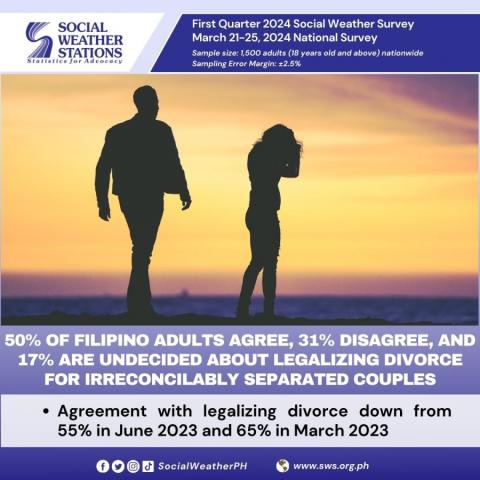
A young Filipino couple is married at the altar of Manila's Cathedral of the Immaculate Conception in the Philippines in 2023. (Dreamstime/Neil Bussey)
The Philippines is the only state outside the Vatican prohibiting divorce — for now, as a new House bill is currently in the works to legalize it.
The proposed Absolute Divorce Act (House Bill No. 9349) passed the third and final reading in May this year and is still awaiting Senate approval before the president signs it into law.
While the Conference of Major Superiors in the Philippines had not issued an official statement on the divorce bill as of this writing, some leaders of the Catholic church and women religious in the country have voiced their firm stand against it.
"There will no longer be stability in marriage with the legalization of divorce," said Sr. Gina Rama, a member of the Daughters of St. Paul, whose opinion is in line with the official stance of the Philippines' bishops. "The marriage vows made in the name of God, and the promise to stay for better and for worse until death will become merely a lip service."
According to Article 2, Section 12 of the constitution, "the State recognizes the sanctity of family life and shall protect and strengthen the family as a basic autonomous social institution," though legal separation and annulment of marriage are currently allowed in the Philippines.

Sr. Gina Rama at the Daughters of St. Paul bookstore in Pasay City, Philippines (Oliver Samson)
The grounds for absolute divorce include psychological incapacity, irreconcilable differences, marital abuse, sex reassignment surgery, and separation of the spouses for at least five years.
But if either of the couple get married again after divorce, they may encounter the same marital difficulties, Rama said, adding that marital problems could be resolved by addressing the core issue that causes them. The couple could seek professional help, like consulting a marriage counselor, or joining the Christian Family Movement, or Marriage Encounter in the parish, she suggested.
House Rep. Edcel Lagman Sr., author of the bill, is pushing its legalization to provide an option for people caught in "unhappy and irreparable marriages," according to Philippine News Agency.
The sisters and the church promote the protection of the wife from all domestic violence, Rama noted, adding that divorce could not guarantee that there would not be the same abuses after remarrying. An abusive husband could be psychologically sick, she said. If divorce would be legalized, he could multiply abused wives. If this is the case, professional help should be sought to address the problem.
Pro-divorce advocates, however, question why women suffering from abuse are being trapped by law in marriages gone unhappy and abusive.
Advocates for the bill in the Philippines challenge those who oppose it by arguing that if they are happy with their marriage, they should not deny abused and unhappy individuals the chance to be free and happy again by way of a divorce law.
Advertisement
In June, the Center for Catholic Theology and Social Justice at the Ateneo De Manila University issued a statement making public the center's support of the divorce bill.
The church should not overlook the reality of difficulties faced by couples and families while it underscores its teachings on marriage and family, the center stated.
"Our role as a community for the success of any marriage is indispensable. When we do our part, marriage can truthfully be a commitment for better and for worse. Divorce ought to be only a last resort but we must not stand in the way of those who truly need it." (The center made clear that its views on the divorce issue were solely of itself, and not of Ateneo De Manila, its Department of Theology, or the Jesuits who run the university.)
A Social Weather Stations survey, conducted March 21-25 this year, found that 50% of the Philippines' adult population favored the legalization of divorce.
The number in favor of divorce went down from 55% in June 2023 and 65% in March 2023, Social Weather Stations said.
Legalizing divorce is most popular among men and women with live-in partners while moderately strong among widowed and separated women, and men who never married. Widowed and separated men, married women, and married men are most likely to oppose it, the survey said.
But the Catholic Church — the biggest opponent of the divorce bill — has been firm in its position.
In a pastoral statement made public by the Cubao Diocese July 5, Bishop Honesto Ongtioco echoed the church's stand against the divorce bill.
"To allow the dissolution of a valid marriage is to rob us of an image of absolute love that values each person regardless of our own mistakes and shortcomings," Ongtioco said.
"We have to be wary of the effects of divorce on the family," he continued. "Research has shown that divorce has an adverse effect on a child’s educational performance and reduces the time, energy, and financial resources available for parenting."
Sr. Cynthia Tabañag, a member of the Missionary Catechists of the Sacred Heart, told GSR that the children should always be part of the decision-making between husband and wife.
As parents, they should always take into consideration the welfare of their children, she said; a family is not just about the husband and the wife alone.
"If Christ is the center of the marriage, there will be no problem that cannot be resolved," she said. "The husband and wife should stand by their marriage."
Tabañag's parents decided to part ways when she was still young. That experience deeply wounded her.
"It hurt and scared me that my family would get broken," she said. "I ran away to try to make them change their mind. And thank God, my parents stayed together."
For Ninotchka Rosca, a Filipino feminist, author and human rights activist, a divorce law would offer a chance "to realign how Filipino culture views marriage, to render it more attuned to what these times require."
"It would enable us to move toward a rational understanding of marriage, that is not simply an exchange of vows but also a contract," she said.
Most of the annulment petitions come from women, she noted. The annulment process could take decades and, as a result, could "invite what the church considers adultery," Rosca said.
"As a republic, our tendency should be toward the expansion of rights and freedoms for many, rather than a restriction of those," she said. "And women do represent more than half of the population of the country."
She added that counseling for children affected by a divorce "would be a means to ease the transition."

Wedding decorations are seen at the entrance to Santa Lucia Parish Church in San Fernando, Pampanga, Philippines, in 2021. (Wikimedia Commons/FBenjr123)
Jose Mario De Vega, a professor at National University of the Philippines, said the divorce bill "should be allowed now" to become a law.
"If we are truly a democratic state, we should recognize and respect the democratic and personal choice of each citizen," he said. "This choice should be put into consideration in this issue."
"Many couples still live under one roof despite having already lost the love for so long for one reason or more," De Vega said. "One of the couples usually has to bear most of the sufferings, and mostly it is the woman because she thinks about the children," who sometimes even encourage their parents to separate due to the conflicts evident in their relationship, he added.
For her part, Rama believes that "lawmakers should not push for a measure that will weaken marriage, but instead legislate for policies that will strengthen it and the family."
She suggested policies that could assist couples facing marital problems, such as incentives for couples to reach 25 years of marriage, or more marriage counseling centers. "Things like this can embolden marriages," Rama said.
"In most cases, the cause of marital problems is financial," she said. "Let the government create more job opportunities for the jobless."
The church and the government should have an effective collaboration to help address the roots of marital problems, and schools ought to teach marriage as sacred, Rama stressed.

Divine Savior Sr. Adeline Abamo (Oliver Samson)
Sr. Adeline Abamo, former regional superior of the Sisters of the Divine Savior, believes marital problems could be addressed with an open mind, humility and acceptance.
"There must be a root cause for the abuse," she said. "Identifying the root cause and addressing it can save the marriage. The abuser needs humility and cooperation to resolve the problem."
In a pastoral statement on July 11, the Catholic Bishops' Conference of the Philippines encouraged Filipinos: "Think about the many times your parents had gotten into each other's nerves and were almost tempted to call it quits. Think about the number of times your father slept 'outside the kulambo [mosquito net]' or your mother packed up her things and brought you with her to her parents' home because of a misunderstanding between the two of them."
In the pastoral statement, the bishops also invited the people to ponder "what could have long happened" to their family, "if civil divorce had already been available" when they were still young and their parents had "irreconcilable differences" at the time.
The bishops, reiterating their stand against divorce, said they could "only propose but never impose."
Abamo said that sisters "are morally duty-bound to safeguard the sanctity of marriage and the family."
"Our position is always for the protection of the matrimony and the children," she continued. "We can only speak from our moral duty and pray for the preservation of marriage and family. But we cannot impose our will on couples."










